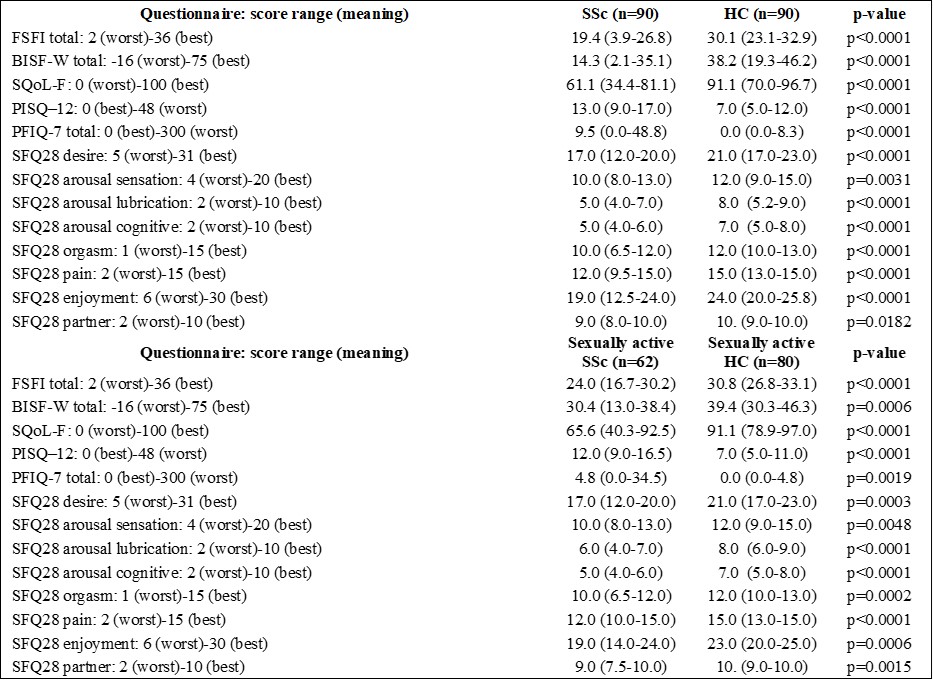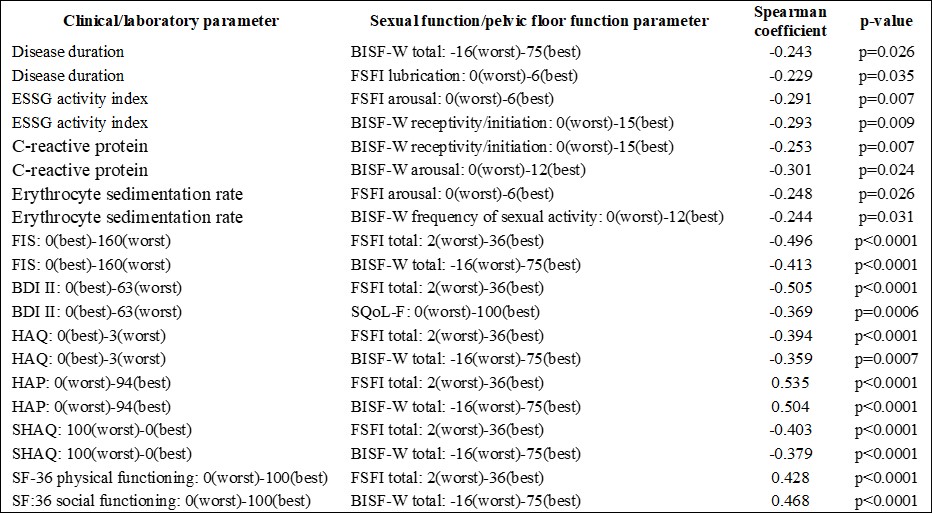Session Information
Session Type: Poster Session B
Session Time: 9:00AM-11:00AM
Background/Purpose: Systemic sclerosis (SSc) is a chronic, multisystem, connective tissue disorder characterized by fibrosis of the skin and internal organ involvement. These serious clinical manifestations can be associated with significant impairment of quality of life including sexual life. The aim of this study was to assess sexual functioning in female SSc patients compared to age-/sex-matched healthy controls (HC) and to determine the association between sexual health impairment and physical and psychological aspects of the disease.
Methods: In total, 90 women (70 currently have a partner) with SSc (mean age: 49.1, disease duration: 6.1 years, lcSSc/dcSSc: 62/28, mRSS: 9.3, ESSG activity index: 2.1), who fulfilled the ACR/EULAR 2013 criteria, and 90 healthy controls (82 currently have a partner, mean age: 49.1) without rheumatic diseases filled in 12 well-established and validated questionnaires assessing sexual function [Female sexual function index (FSFI), Sexual function questionnaire (SFQ28), Brief index of sexual function for women (BISF-W)], quality of sexual life [Sexual quality of life questionnaire – female (SQoL-F)], pelvic floor function [ Pelvic floor impact questionnaire–short form 7 (PFIQ-7), Pelvic organ prolapse/urinary incontinence sexual questionnaire–short form (PISQ-12)], fatigue [Fatigue impact scale (FIS)], physical activity [Human activity profile (HAP)], depression [Beck’s depression inventory II (BDI-II)], quality of life [36-item Short form survey (SF-36)] and disability [Health assessment questionnaire (HAQ), Scleroderma health assessment questionnaire (SHAQ)]. Routine laboratory testing was performed. Data are presented as median (IQR).
Results: Patients with SSc reported significantly greater prevalence and severity of sexual dysfunction (FSFI, BISF-W, SFQ28 – in all subscales as well as total scores), worse sexual quality of life (SQoL-F) and pelvic floor dysfunction (PISQ-12, PFIQ-7) compared to HC (table 1). When we analyzed only sexually active patients compared to sexually active HC, the difference between patients and HC remained significant (table 1). The prevalence of sexual dysfunction in patients with SSc according to the FSFI cut-off score was 77%. Worse scores in SSc patients were associated with disease duration, disease activity, increased inflammation, greater fatigue, severer depression, increased disability, deteriorated quality of life, and worse ability to perform physical activities (table 2). We did not observe any associations with the current prednisone dose or skin score. Furthermore, no significant differences between lcSSc and dcSSc were found.
Conclusion: Women with SSc reported significantly impaired sexual function and pelvic floor function compared to healthy females with identical age. The prevalence of sexual dysfunction in SSc patients was 77%. Worse scores in SSc were associated with disease duration, disease activity, increased inflammation, severer disability, physical inactivity, fatigue, depression, and decreased quality of life.
Acknowledgements: Supported by MHCR 023728, GA UK 1578119 and SVV 260373
 Table 1. Sexual function and pelvic floor function in women with SSc and healthy controls
Table 1. Sexual function and pelvic floor function in women with SSc and healthy controls
 Table 2: Correlation of sexual functioning with clinical/laboratory features
Table 2: Correlation of sexual functioning with clinical/laboratory features
To cite this abstract in AMA style:
Hermankova B, Spiritovic M, Oreska S, Storkanova H, Smucrova H, Pavelka K, Vencovský J, Šenolt L, Becvar R, Tomcik M. Sexual Health Impairment in 90 Female Patients with Systemic Sclerosis [abstract]. Arthritis Rheumatol. 2020; 72 (suppl 10). https://acrabstracts.org/abstract/sexual-health-impairment-in-90-female-patients-with-systemic-sclerosis/. Accessed .« Back to ACR Convergence 2020
ACR Meeting Abstracts - https://acrabstracts.org/abstract/sexual-health-impairment-in-90-female-patients-with-systemic-sclerosis/
